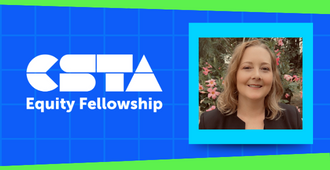Michelle Meier is a computer science consultant at the Central Rivers Area Education Agency in Iowa. In this role, she works with school districts across the state to increase access to computer science education at every level. Her work includes creating computer science plans for schools, providing assistance to implement those plans, and facilitating professional development opportunities to help teachers understand student standards and best practices in computer science. Michelle works with Iowa’s ECEP group and the state Area Education Agency (AEA) computer science team to ensure statewide access to CS education. She also participates in a University of Northern Iowa partnership that helps Iowa teachers earn computer science teaching endorsements.
Michelle strives to ensure that all students, including those in Iowa’s many rural districts, have the same access to quality CS education. She partners and works closely with school districts to develop plans for offering CS education in their schools, in line with their district and state CS goals. Using the Strategic CSforALL Resource & Implementation Planning Tool (SCRIPT), she provides the resources, coaching, and professional development opportunities that districts need to make CS education a reality.
But Michelle’s efforts to bring computer science to all Iowa schools don’t stop at her work with school districts. Along with a CS consultant for Iowa’s Department of Education, Michelle co-leads her state’s new Expanding Computing Education Pathways (ECEP) team. Currently, Iowa does not collect data on computer science access, making it impossible to evaluate whether CS education is reaching students of all demographics, regions, and identities equitably. One of the ECEP group’s first projects is to collect data about CS participation so that they can use this information to create an informed plan for equitable CS instruction across all districts in the state. Michelle says, “This group has expanded into a general statewide computer science group including AEA consultants, district teachers, administrators, coaches, students, parents, community, business, and nonprofits that will inform the direction of CS education in the state.”
Michelle is also one of the leads for a statewide AEA computer science group comprising CS consultants from each of Iowa’s nine AEAs. Together, they collaborate on providing conferences, professional learning opportunities for teachers, and student activities relating to CS. As part of a University of North Iowa grant program that helps Iowa teachers achieve their computer science endorsements, Michelle provides support and facilitates Communities of Practice among participating teachers.
Michelle is accustomed to working in environments where the value of equity may not be immediately appreciated—or even tolerated—by all stakeholders. She’s become adept at encouraging educators and students to have the difficult conversations about equity. “In many of the rural districts where I work,” she says, “those conversations don’t happen, because teachers don’t feel comfortable facilitating them, or believe they don’t need to because their districts aren’t as diverse.”
Still, Michelle models conversations about social justice and its impact on tech whenever she can. In district planning sessions, she encourages teachers and administration to make use of culturally responsive pedagogical practices. She offers discussion starters and lesson ideas that explore social justice within the computer science context, and she has found that teachers are not just receptive, but are actively asking for more. AI has provided particularly fruitful ground for this type of work, says Michelle. “Though it is inanimate, it uses our own behavior as a data set. We’re able to use AI as an object to discuss when really we’re talking about ourselves.”
As a CSTA Equity Fellow, Michelle wants to learn from educators who are doing their equity work in more receptive environments, as well as those who—like many of the teachers in districts she serves—may face hostility or even legal repercussions when they attempt to start conversations about equity. She wants to advance her understanding of the equity goals other educators are pursuing and the strategies they’re using to get there so that she can bring those ideas back to her own work in Iowa.
Coming from an educational environment with fewer CS opportunities for kids, and a political environment that can sometimes feel hostile to conversations about equity, Michelle is excited to share her experiences and learn from her cohort throughout her time as a fellow.

